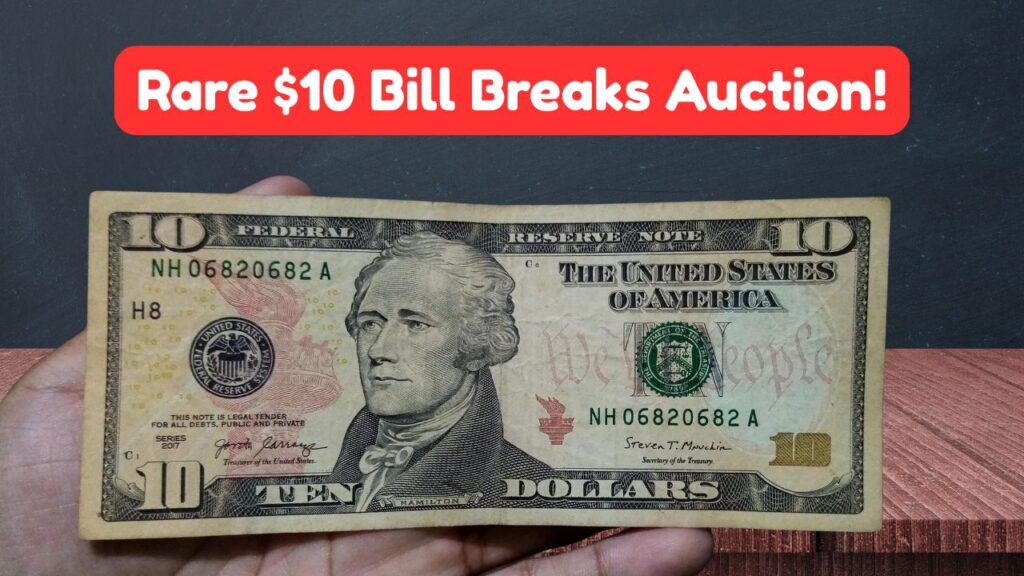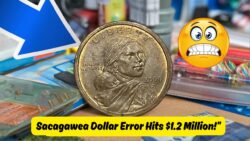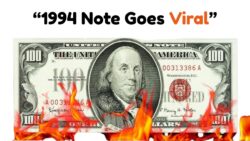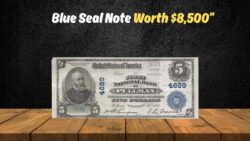$10 Bill – Collectors and currency enthusiasts are always on the lookout for rare banknotes with unique serial numbers. Recently, a $10 bill featuring a rare “solid” serial number made headlines by fetching an astonishing $40,000 at auction. This shocking price tag has left many wondering—what makes such a seemingly ordinary note so valuable? The answer lies in the serial number’s pattern, condition of the bill, and growing interest in fancy currency among collectors. In this article, we’ll dive into what makes a “solid” serial number so rare, why it’s worth tens of thousands of dollars, how to identify one, and how you might be sitting on a small fortune without even knowing it.
What Is a ‘Solid’ Serial Number on Currency?
A solid serial number is one of the rarest and most visually striking types of “fancy” serial numbers. It consists of a single repeating digit across the entire serial number—such as 77777777 or 44444444.
Characteristics of Solid Serial Numbers:
- 8 identical digits (e.g., 22222222)
- No breaks or different digits
- Highly sought after by collectors
- Extremely rare in circulation
These serial numbers are so rare that many collectors are willing to pay huge sums just to own one. The appeal lies in their symmetry, simplicity, and sheer improbability.
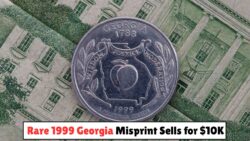 This 1999 Georgia Quarter With Misprint Just Hit $10,000 at Auction – Still in Circulation!
This 1999 Georgia Quarter With Misprint Just Hit $10,000 at Auction – Still in Circulation!
Why This $10 Solid Serial Note Sold for $40,000
The specific $10 bill that recently sold for $40,000 had the solid serial number 88888888, a combination that’s particularly prized in Asian cultures due to the digit 8 being associated with prosperity and good fortune.
Key Value Factors:
| Factor | Explanation |
|---|---|
| Solid Number | All digits identical – extremely rare |
| Digit 8 | Especially valuable due to cultural beliefs (luck, wealth) |
| Condition | Graded as uncirculated or pristine by currency grading services |
| Low Denomination | $10 denomination with fancy serials is rarer than $1 or $100 bills |
| Auction Buzz | Strong bidder competition drove up the final selling price |
It wasn’t just about the numbers—it was the perfect storm of rarity, cultural appeal, and immaculate condition that pushed the price to $40,000.
How Rare Are Solid Serial Numbers?
Only a tiny fraction of printed banknotes have solid serial numbers. Most of these are intercepted by collectors or never make it into general circulation.
Estimated Occurrence:
| Type of Serial | Probability (Approx.) | Notes in Circulation |
|---|---|---|
| Regular Serial | 1 in 1 | Billions |
| Solid Serial | 1 in 100 million | Very few |
| Solid + Lucky Digit | 1 in 800 million | Ultra rare |
| Solid + Perfect Grade | 1 in billions | Museum-level rarity |
The chances of pulling one of these from an ATM are virtually zero, which is why collectors often pay high prices at auctions.
How to Check Your Bills for Fancy Serial Numbers
Believe it or not, your wallet might be hiding a collectible note! While solid serial numbers are very rare, there are other “fancy” types that also hold value.
Types of Fancy Serial Numbers to Look For:
- Solid – All digits the same (e.g., 99999999)
- Radar – Reads the same forwards and backwards (e.g., 12344321)
- Repeater – Repeats a pattern (e.g., 12121212)
- Ladder – Ascending or descending (e.g., 12345678 or 87654321)
- Low Serial – Starts with many zeroes (e.g., 00000025)
How to Spot Them:
- Examine the 8-digit serial number on your note.
- Use a flashlight and clean surface for easier visibility.
- Research recent auction values or consult a dealer.
Tips to Preserve a Rare Note for Maximum Value
Even if you find a potentially valuable note, its condition plays a crucial role in determining the final price.
Do This Immediately:
- Avoid Folding or Wrinkling
- Place it in a Currency Sleeve
- Don’t Use Tape or Glue
- Keep it Away from Moisture and Sunlight
- Store it Flat in a Hard Case
You can also get your note graded by a currency grading agency like PMG (Paper Money Guaranty) or PCGS. A top-grade rating can multiply its market value.
Can You Really Find These Notes in Circulation?
Yes, but it’s extremely rare. Most fancy serial numbers are caught early by bank employees, collectors, or dealers. However, there are stories of lucky finds by ordinary people.
Some notable examples:
- A man in California found a $1 bill with a solid 44444444 serial and sold it for $12,000.
- A woman in Texas spotted a ladder note and earned $3,500 from a collector.
- A bank teller in New York set aside 77777777 notes and made a fortune reselling them.
It’s always worth checking your change!
The sale of a $10 bill with a solid serial number for $40,000 shows just how valuable paper currency can become when rarity, symmetry, and culture come together. While it may seem like a stroke of luck, being informed and vigilant can dramatically increase your odds of finding something valuable. So next time you receive change, don’t just stuff the cash into your wallet. Take a closer look—you might be holding a tiny treasure worth thousands of dollars!
FAQs
Q1. What is a solid serial number?
A solid serial number is when all eight digits on a bill are exactly the same, like 88888888.
Q2. Why are solid serial numbers valuable?
They’re extremely rare and visually striking, making them highly desirable to collectors.
Q3. Can I find one in my wallet or ATM cash?
It’s very rare, but possible. Always check your notes carefully.
Q4. How do I protect a rare serial number bill?
Avoid folding it and keep it in a protective plastic currency sleeve.
Q5. Where can I sell my fancy serial number notes?
You can sell them via online auctions, currency dealers, or collectors’ forums.

